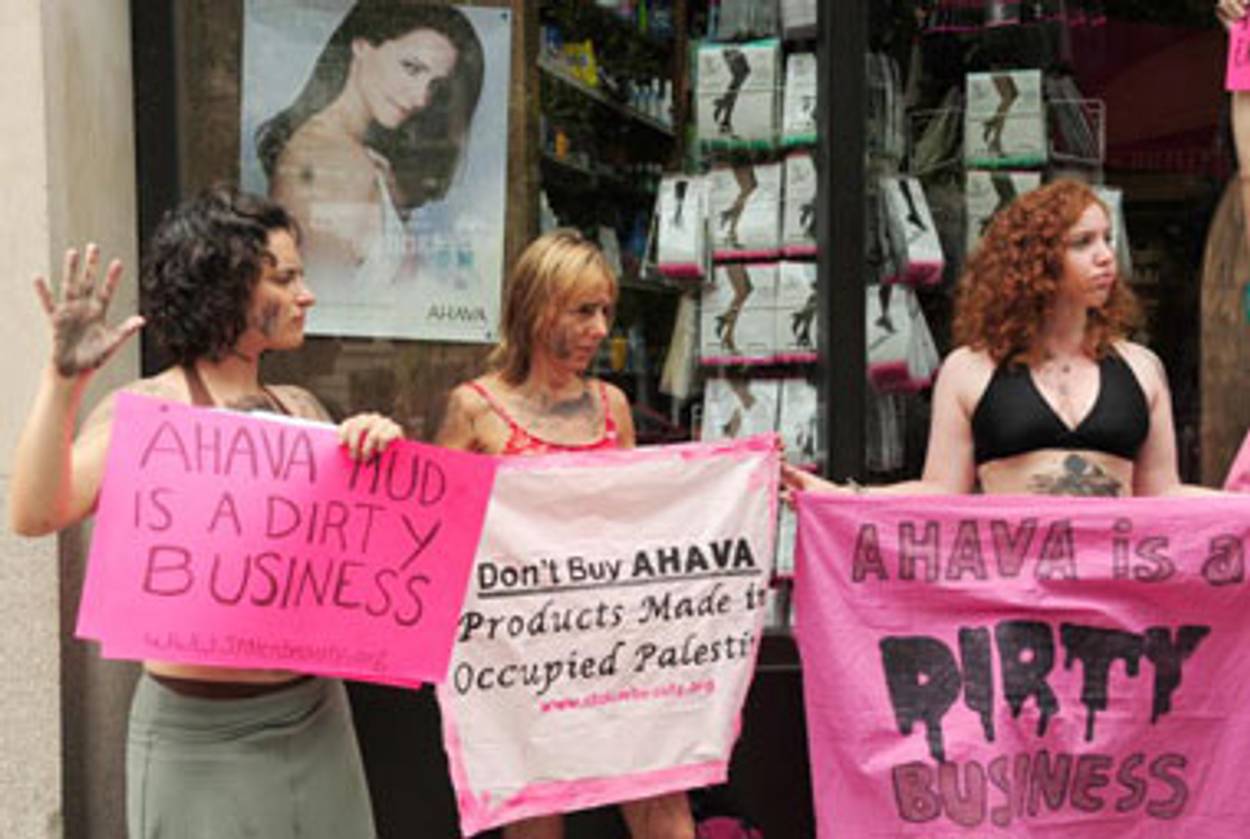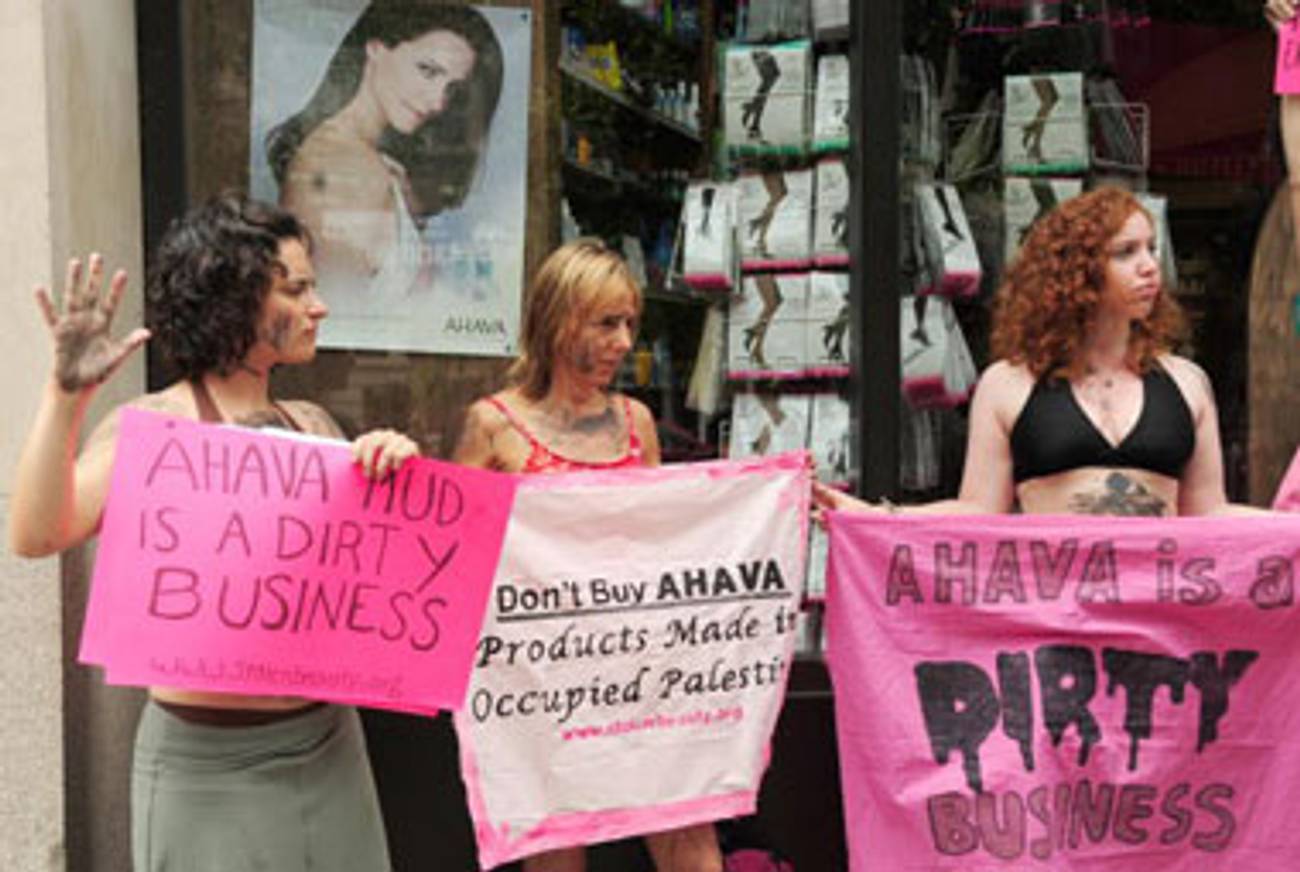Pink Panthers
Why the antiwar group Code Pink has targeted an Israeli cosmetics company




Code Pink Women for Peace, the grassroots activist organization largely known for its creative and controversial demonstrations against the wars in Afghanistan and Iraq, has found a new target in Ahava, the Israeli cosmetics company that uses minerals mined from the Dead Sea in its products. “Stolen Beauty,” Code Pink’s recently launched campaign, claims that Ahava—which is headquartered in the kibbutz Mitzpeh Shalem, a settlement in the West Bank—is excavating in occupied territory, a direct violation of the Fourth Geneva Convention. The campaign gathered steam earlier this month when the humanitarian group Oxfam International announced that it was suspending all publicity work with Kristin Davis, best known for her role as Charlotte in Sex and the City, who had been a spokeswoman for Ahava’s products. “Oxfam remains opposed to settlement trade, in which Ahava is engaged,” Oxfam said in a statement, earning Code Pink’s initiative international press coverage.
Code Pink earned a name for itself since its founding in 2002 for its ostentatious political street theater and disruption of government events, which included displaying coffins outside Walter Reed Medical Center in Washington D.C., and publicly confronting administration officials to protest the war in Iraq. (Most famous, perhaps, was Desiree Ali-Fairooz, a Code Pink member who approached then-Secretary of State Condoleezza Rice with red paint on her hands, shouting, “The blood of millions of Iraqis is on your hands!”) Yet while these attention-getting stunts have quickly faded from the U.S. political news cycle, the Stolen Beauty campaign has so far demonstrated a lasting power in progressive circles, not least because of the precedent that exists at the international level for boycotting Israel.
So why is an antiwar group targeting a moisturizer manufacturer?
Because the group was looking for a way to support the Palestinian cause. “We have been a member group of the U.S. Campaign Against the Israeli Occupation for several years,” explained Nancy Kricorian, Code Pink’s New York City coordinator and the force behind its Stolen Beauty campaign. “But the recent Israeli assault on Gaza was a tipping point for women on staff and our membership. We felt that it was time for Code Pink to take a more active public role in supporting a just peace for Israelis and Palestinians.”
Searching online for a potential boycott target, Kricorian was surprised to see Ahava’s name on a list of companies that benefited financially from the Israeli occupation. “I knew there was a plastic bottle of Ahava Eucalyptus Mineral Bath Salts sitting on the windowsill next to the tub in my bathroom,” she said. Going on the company’s website, she was struck by its environmentally conscious and progressive tone. “Our manufacturing processes,” it read, “are non-polluting and environmentally conscious. No animals are involved in testing phases and all of our products are encased in recyclable tubes, bottles and jars.” But all this, Kricorian thought, did little to cover up the basic violation inherent to Ahava’s very existence: as the company is headquartered in territory occupied by Israel since 1967, and as it is dependent solely on extracting natural resources that, by international conventions, belong not to the occupier but the occupied party, Ahava is acting in violation of international law. “We chose Ahava because their practices are blatantly in contravention of international law,” she said. “It also made sense for a women’s peace group to focus on a cosmetics company whose products were primarily aimed at women, rather than a company such as Caterpillar, which sells bulldozers.”
A spokesperson for the company did not return calls for comment, but Daniel Seaman, the Director of Israel’s Government Press Office, said he found the boycott bizarre. “The Palestinians did nothing with this land when they had it,” Seaman said. “And the Palestinians still have access to the Dead Sea. If they wanted to, they could set up a factory themselves.” While Mitzpe Shalem was technically beyond the Green Line, he said, the pioneering Israelis who built the kibbutz in 1970 were not displacing Palestinians but settling empty land. With Ahava currently employing Palestinian workers, Seaman added, the boycott is “just another way of singling out Israel for criticism.”
The campaign, Kricorian said, was orchestrated with peace activists in Israel and the West Bank, and was designed to leverage economic pressure in protest of the country’s policies. “We believe that the Stolen Beauty campaign will help to highlight the destructive role played by Israeli profiteers and illegal settlements in the Occupied West Bank,” she said. “We hope to educate the public about Ahava’s illegal practices and in so doing take some of the profit out of occupation.”
She also hopes it will keep her own members engaged. “The antiwar movement was in a sort of holding pattern following Obama’s election,” she said. “But as public sentiment turns against the war in Afghanistan, we feel we will once again be able to mobilize more people.”
Liel Leibovitz is a senior writer for Tablet Magazine and a host of the Unorthodox podcast.
Liel Leibovitz is editor-at-large for Tablet Magazine and a host of its weekly culture podcast Unorthodox and daily Talmud podcast Take One. He is the editor of Zionism: The Tablet Guide.